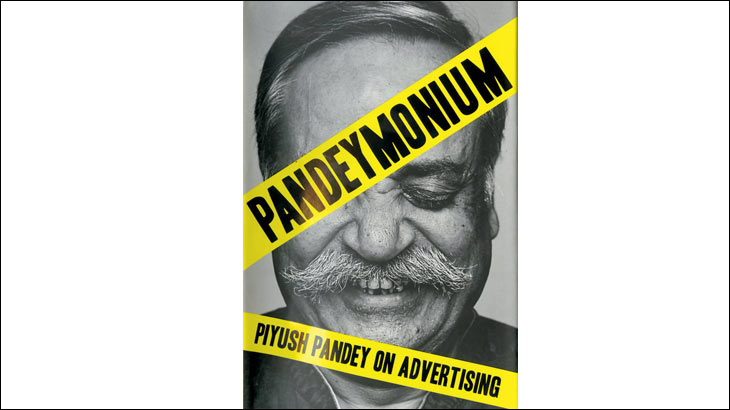The book Pandeymonium, title of which has been inspired by Piyush Pandey’s family group on Whatsapp, is an unfeigned account of the things he loves – family, cricket, Ogilvy and advertising; and how the universe conspired to make him the man he is today. Early on in the book he talks of how his childhood environment instilled the creative gene in him and his siblings, and how his observational and conversational skills were naturally honed in his early years to develop personality traits that he’d find immensely helpful in his career of advertising.
His memories form the key to every single chapter in Pandeymonium, and every memory has strong point(s) that makes it worth remembering. For example, he remembers a particular utterance of her sister, which his father was quick enough to turn into an impromptu song, which was ‘Amma chai pakayi kya?‘ The choice of words used made him remember it to this date, and while I’m pretty sure it’s a great family joke, it’s also a brilliant creative trigger. Cricket, Pandey’s most loved sport, was not as mainstream then as it is now, but still the man passionately pursued the game because it caught his interest. Most of the advertisements he worked on have a cricket-based premise which ultimately struck a chord with the audience. He associates his huge family to Google, stating that all solutions to all the questions he’s had were sought within the house itself. With so many people from so strikingly different backgrounds, it really isn’t hard to collectively appreciate it as a huge knowledge pool.

The best part here is it stays away from heavy jargon. It’s as carefree as Pandey himself, and delivers strong poster-worthy quotes wrapped around his experiences and learnings over the years. The best part are the anecdotes, over which he relies so often to drive home a point, and they’re effective too. He advises people to stop being insecure of their ideas, as this will never let a good idea sprout and grow. There’s important advice for people in the advertisement business, or whoever is working towards building a brand, and that no brand or category is ever boring. He even lists the importance of the client-ad agency relationship, stressing on the fact that when a brand is willing to take risk, an ad agency can deliver something beyond exceptional. As for Oglivy, he believes that the company is more multicultural than multinational. And to back all these data up, the author has peppered up the book with interesting pictures of himself, his family and some of his most successful ad-campaigns ever.
This here is one heartfelt, lively read which asks its reader to focus on the implementation idea, and to give lesser importance to who takes the credit. Pandeymonium is not a guide you could turn to for ideas, but it’s definitely inspiring.
You may purchase this book from Flipkart here or from Amazon here – 

The book Pandeymonium, title of which has been inspired by Piyush Pandey’s family group on Whatsapp, is an unfeigned account of the things he loves – family, cricket, Ogilvy and advertising; and how the universe conspired to make him the man he is today. Early on in the book he talks of how his childhood environment instilled the creative gene in him and his siblings, and how his observational and conversational skills were naturally honed in his early years to develop personality traits that he’d find immensely helpful in his career of advertising.
His memories form the key to every single chapter in Pandeymonium, and every memory has strong point(s) that makes it worth remembering. For example, he remembers a particular utterance of her sister, which his father was quick enough to turn into an impromptu song, which was ‘Amma chai pakayi kya?‘ The choice of words used made him remember it to this date, and while I’m pretty sure it’s a great family joke, it’s also a brilliant creative trigger. Cricket, Pandey’s most loved sport, was not as mainstream then as it is now, but still the man passionately pursued the game because it caught his interest. Most of the advertisements he worked on have a cricket-based premise which ultimately struck a chord with the audience. He associates his huge family to Google, stating that all solutions to all the questions he’s had were sought within the house itself. With so many people from so strikingly different backgrounds, it really isn’t hard to collectively appreciate it as a huge knowledge pool.
The best part here is it stays away from heavy jargon. It’s as carefree as Pandey himself, and delivers strong poster-worthy quotes wrapped around his experiences and learnings over the years. The best part are the anecdotes, over which he relies so often to drive home a point, and they’re effective too. He advises people to stop being insecure of their ideas, as this will never let a good idea sprout and grow. There’s important advice for people in the advertisement business, or whoever is working towards building a brand, and that no brand or category is ever boring. He even lists the importance of the client-ad agency relationship, stressing on the fact that when a brand is willing to take risk, an ad agency can deliver something beyond exceptional. As for Oglivy, he believes that the company is more multicultural than multinational. And to back all these data up, the author has peppered up the book with interesting pictures of himself, his family and some of his most successful ad-campaigns ever.
This here is one heartfelt, lively read which asks its reader to focus on the implementation idea, and to give lesser importance to who takes the credit. Pandeymonium is not a guide you could turn to for ideas, but it’s definitely inspiring.
You may purchase this book from Flipkart here or from Amazon here –
